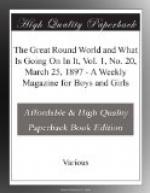Westminster Hall after a while became part of the King’s palace of Westminster, where the famous Henry VIII. lived. This palace was destroyed by fire except the grand old Hall, which was left standing alone until the new Houses of Parliament were built on the ground where the palace had once stood, and the Hall became a part of the Houses of Parliament.
This grand old building with its wonderful arched roof has seen many great assemblies in its 800 years of life, but this inquiry into the affairs of the Transvaal is by no means the least interesting of them.
If you take your map, you will see that the southern part of Africa is divided into several states and colonies.
Cape Colony, the most southerly of all, belongs to England. Then comes the Orange Free State, and then the South African Republic, or the Transvaal, as it is called. You will notice that the English possessions creep up the coast in front of the Transvaal, and also form its western or land boundary.
The Transvaal is a Republic originally settled by the Dutch. Its inhabitants are called Boers, and they are a race of sturdy farmers. It is from their employment that they get their name of Boer. In the Dutch language boer means a peasant, a farmer, or a tiller of the soil. It is the same word as the German Bauer, a peasant.
These Boers are governed by a clever old man named Paul Krueger,—Oom (or Uncle) Paul, as his people call him.
England, as you will see by your map, owns vast tracts of land in South Africa, and according to her regular practice she is trying to enlarge her possessions still further. Wherever England establishes a colony, she reaches out on either side of her, and takes, if possible, a little piece of land here, and another little scrap there, until by and by she has laid hold of the greater part of the land around her.
She has been following her usual custom in South Africa.
But the Boers are not fond of the English, and they have been trying with all their power to keep these neighbors of theirs as far away from them as possible. As the English have advanced, the Boers have retreated, even giving up the diamond mines of Kimberly in the process of moving.
One day, however, rich gold-fields were discovered on the Witwaters Rand. A Rand is the high land on either side of a river valley.
This settled matters for the Boers. From the moment gold-fields were discovered, Englishmen poured into the Transvaal.
The Boers, who, as we have said, are a quiet farming people, were not pleased with this invasion of foreigners. They christened them Uitlanders, which means outsiders, and they are decidedly not in love with them.
The capital of the Transvaal is a town called Pretoria. It is the seat of the government, and is a simple, unpretentious town, situated in the centre of the little Republic.
When the Uitlanders poured over the borders into the gold-fields, they desired to have a town somewhat nearer to the Rand and the gold-fields than Pretoria was, so they founded Johannesburg.




